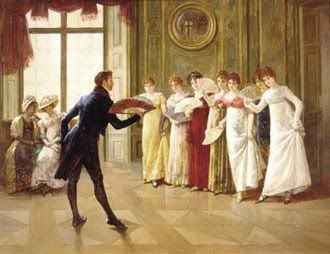Girls would wax poetically about Mr. Darcy and how dreamy he was and how romantic the novel was and I just sat there, scratching my head. For most of the novel, he was very mean to Elizabeth Bennett and frankly, I felt as if he did not deserve her. Now Colonel Brandon (and to a lesser extent Edward Ferrars), there was a character where I could understand the infatuation. His constancy of affection throughout the novel is admirable and endearing and he becomes a sort of good guy who you are rooting for to get the girl by the end of the novel.
For those of you unfamiliar with the book or various film adaptations, Sense and Sensibility follows the story of two young women in the Regency period of England, so called because at the time King George III was deemed unfit to rule and his son, the Prince Regent, ruled by proxy. Elinor Dashwood, the elder sister, represents sense, logic and restraint while Marianne Dashwood, the younger sister, represents sensibility or romanticism, a sort of girl who puts the feelings of her heart over what is socially acceptable, in a time that had very rigid rules, especially for women, on propriety and courtship.
 |
| Source |
As I noted in this post, I loved the book and found it very enjoyable to read! The mix of dialogue and prose seemed more equal in this novel than in Pride and Prejudice, which may be one reason I enjoyed it more. It was still not as close to the balance we are used to as modern readers (Austen's works are much heavier on prose than dialogue, telling you who the characters are or what they are thinking instead of revealing some of these truths through dialogue) but it is not so distracting or boring as to slow down the reading of the book.
I felt the middle dragged slightly, especially considering how long it took Austen to get the sisters to London. Having seen the movie dozens of times, I knew there was a great deal more to the story after they arrived in London and I was anxious for the characters to get there! On the flip side, I felt that the ending took far too little time to tie up all the ends--it was as if Austen was done with the story and trying to tie it up as neatly as possible in as little time as possible. This is a criticism I have had of books before, so this might be more of a personal preference thing.
I felt that Austen did a great job fleshing out even the minor characters, like Lady Middleton, Mrs. Jennings and Mr. John Dashwood. Her descriptions and the dialogue she wrote had me laughing at loud at times, especially when it came to the greedy and petty nature of Mr. John Dashwood. One could definitely see why Jane Austen is known for her acerbic wit and social commentary!
Speaking of social commentary, many of critiques she dishes out could easily be applied to modern day life as well, especially those involving money, greed and social status. This is a tribute to Jane Austen and a testament to why these novels continue to be so popular among modern audiences. Her characters and their plight are relatable and approachable, even if you know nothing about the time and place in which they are set.
So, if you are looking to read a Jane Austen novel and have been intimidated by her works and the writing style before now, might I suggest you start with Sense and Sensibility?! You might actually enjoy it. I know I did!
P.S. Today I'm featured over at Aiukli-Because Life is Beautiful. Check it out here!
P.P.S. As fate would have it, I wrote about Japan and how it is one of the places I most want to visit just days before the earthquake and tsunami. Like many people across the globe, my thoughts and prayers are with the Japanese people as they struggle to rebuild.

Sounds like a great read. I may have to grab it from the library!
ReplyDeleteI agree with what you said about the minor characters. I really liked Mrs. Jennings! She wasn't given much credit in the beginning though. Also I think that a lot of the things she speaks about could hold true today, although many of them are so different. I mean, why did Elinor keep her secret about Edward for so long!?
ReplyDeleteYou are right, the book kind of ended abruptly. It seems Austen kind of wrapped it up in a hurry.
i love jane austen and devoured sense & sensibility back in the days of high school novel reading and essay writing. great analysis, it makes me want to go in for a re-read!
ReplyDeleteI have read P&P and only seen the movie S&S. Thank you for this write up-- really enjoyed it.
ReplyDeleteRight on. I agree with you about it dragging in the middle. I had to push myself to get past that. And about the ending too, I feel like just a few more pages could have really flushed it out. I really wish Austen had said more about Marianne's feelings for Brandon. All in all, I'm glad I read it - and I wouldn't have if not for the BBC! :)
ReplyDelete@ Ashly: It's a great classic!
ReplyDelete@ Kyria: Secrecy is definitely a big theme in the book, as Kate pointed out. I think that part of Elinor's sense of propriety meant she had to go above and beyond to ensure the secret remained just that, a secret :)
@ marissa: Thanks! I loved the book--guess that's why it's mandatory reading for high schoolers, huh?
@ Robyn: Tomorrow I'll be back with an analysis of how the book stacks up the film :)
@ Kate: So glad to have you as a member of the BBC! I think I would have been happier with Marianne's choice to be with Brandon if she would have spent some more time on it too. I did like that the sisters ended up as almost neighbors at the end. At a time when the sole way of communication was letters, it would have been a comfort to be so close by :)
Oh my gosh! KT, I can't believe my eyes!! I LOVE, love JA and drop everything when PBS shows the BBC films. I really enjoy her writing. But... alas, I am a hopeless romantic who is forever in search of a period novel to read! If you have to watch P&P, I highly recommend the one with Colin Firth. I've never been a fan of the underfed gal that was in the Pirates movie.
ReplyDeleteI'm just saying...
Jen
@ Jen: Ironically even though I am a much bigger S&S fan, I did not enjoy all of the artistic liberties they took with the new P & P film--guess I'm a bit of a period piece purist :) I will definitely have to watch the BBC version though because I have heard so many great things!
ReplyDeleteI love your in-depth analysis of the book! Mine's a bit less involved, but I'm definitely glad to have been a part of the book club. :)I found the book enjoyable, but definitely not one of my fave.
ReplyDeleteSense and Sensibility is the only book of Austen that I have (for now) and reread it more times than I can remember.
ReplyDeleteYou do a great analysis of the book... btw.
Have a great day ahead.